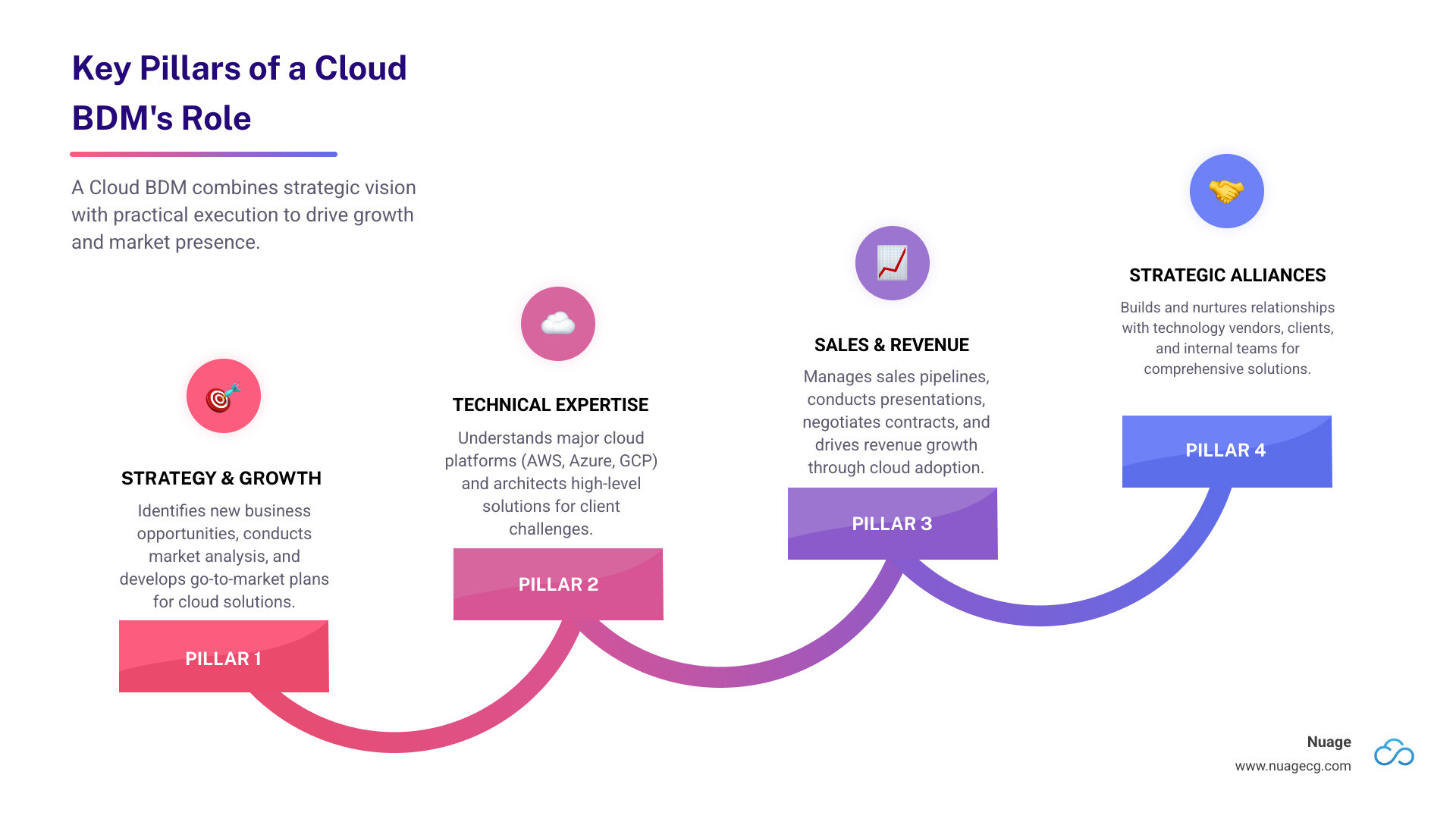The Architect of Cloud-Driven Growth
A cloud business development manager is a strategic professional who identifies and pursues new business opportunities by leveraging cloud computing solutions to drive revenue growth and expand market presence. They serve as the bridge between complex cloud technology and tangible business outcomes, combining technical expertise with sales acumen to help companies steer digital change.
Key responsibilities include:
- Identifying new business opportunities in cloud markets
- Building and managing sales pipelines for cloud solutions
- Developing strategic partnerships with technology vendors
- Conducting technical demonstrations and solution presentations
- Collaborating with internal teams to deliver comprehensive cloud strategies
Essential qualifications:
- 3-8 years of experience in business development or cloud sales
- Deep understanding of major cloud platforms (AWS, Azure, GCP)
- Strong technical knowledge of cloud services and business applications
- Proven track record of meeting sales targets and building client relationships
- Bachelor’s degree in business, technology, or related field
This role demands a unique blend of technical knowledge and business strategy skills. Unlike general business development managers, cloud BDMs must understand complex technologies like NetSuite and IFS Cloud to craft solutions that truly solve business problems.
I’m Louis Balla, CRO and partner at Nuage, with over 15 years of experience in digital change and supply chain optimization. My work with cloud business development managers has shown me how crucial this role is for companies looking to maximize their ERP investments and drive changeal growth.

What is a Cloud Business Development Manager and What is Their Goal?
A cloud business development manager (Cloud BDM) is a pivotal figure in the digital economy. Their primary goal is to strategically identify and pursue new business opportunities that leverage cloud computing. They are architects of cloud-driven growth, focused on driving revenue, expanding market presence, and fostering strategic partnerships. They connect businesses with the right cloud technologies to solve complex problems and open up new levels of efficiency.
The Strategic Role in a Tech Company
At Nuage, a digital change company with over 20 years of experience, a Cloud BDM is a strategic partner and trusted advisor, acting as a bridge between complex cloud technology and tangible business outcomes. They ensure clients invest in solutions that fuel their growth. For example, when a client needs \”more efficient operations,\” a skilled Cloud BDM identifies their unique challenges and articulates how a specific solution, like a powerful Cloud ERP System, can drive their business forward. This involves understanding pain points, crafting value propositions, and developing Go-to-Market (GTM) strategies. Their consultative approach builds long-term relationships and leads to stronger partnerships and more impactful digital changes.
Key Performance Indicators (KPIs) for Success
Success for a cloud business development manager goes beyond closed deals. While Sales Quotas are crucial, we also measure performance by the quality and long-term impact of their work. Key KPIs include:
- Pipeline Growth: The volume and value of new opportunities they identify and nurture.
- New Business Wins: Securing deals, especially complex ones that transform a client’s operations.
- Client Retention and Expansion: Setting the stage for long-term satisfaction and future upsells.
- Customer Satisfaction: Ensuring implemented solutions meet client needs and drive their success.
- Strategic Partnership Development: Forging relationships with technology vendors to generate future business.
- Market Penetration: Establishing a presence in new markets or industry segments.
Success is defined by the long-term adoption of cloud services and the strength of the partnerships they build, leading to sustained growth.
A Day in the Life: Core Responsibilities and Activities
A cloud business development manager moves constantly between strategy and action. In a single day you might:
- Prospect and qualify leads through market research, LinkedIn outreach, and industry events.
- Meet with clients to uncover pain points, map requirements, and present high-level cloud architectures.
- Collaborate with solution architects to scope proposals that blend IaaS, PaaS, SaaS, and full-suite platforms like NetSuite or IFS Cloud.
- Update the CRM, track pipeline health, and prepare accurate forecasts for leadership.
- Nurture partner relationships with AWS, Microsoft, Google, and key ISVs to open up co-selling opportunities.
The mix of client interaction, internal alignment, and technical problem-solving keeps the role and highly rewarding.
The Essential Toolkit for a Cloud Business Development Manager

Succeeding as a cloud business development manager requires a rare blend of technical fluency and commercial savvy. Think of it as being bilingual in “cloud” and “C-suite”.
Essential Cloud Platform Knowledge
You must speak confidently about the service catalogs, pricing models, and security postures of AWS, Microsoft Azure, and Google Cloud Platform. A working grasp of IaaS, PaaS, SaaS, containerization, and zero-trust security lets you translate features into ROI during executive conversations.
Why Cloud ERP Matters
Infrastructure wins the sale, but an end-to-end platform keeps the customer. Mastery of cloud ERP suites\u0014especially NetSuite and IFS Cloud\u0014lets you position process automation, real-time analytics, and supply-chain visibility as strategic outcomes, not line-item costs.
Core Business & Interpersonal Skills
- Communication: distill technical jargon into clear business value.
- Strategic thinking: size markets, build GTM plans, and outmaneuver competitors.
- Negotiation: align pricing and terms with client expectations and margin goals.
- Relationship building: earn trust with prospects, partners, and internal teams.
- Adaptability: keep pace with the lightning-fast evolution of cloud services.
Combined, these skills turn a Cloud BDM into the linchpin between digital strategy and measurable growth.
How This Role Differs from Other Tech & Sales Positions
The title “Business Development Manager” is broad, right? It can mean so many things! But when you add “Cloud” to it, it really changes the game. It signals a specialized role with a unique set of skills and demands. It’s easy to confuse a cloud business development manager with other great roles in the tech and sales world. So, let’s clear up any confusion and explore what truly sets this vital position apart.
Think of it this way: while many roles contribute to a company’s success, the cloud business development manager has a very specific focus on strategies that drive growth within the cloud ecosystem.
| Feature | Cloud Business Development Manager | General Business Development Manager | Cloud Operations Manager |
|---|---|---|---|
| Primary Focus | Driving new business specifically with cloud solutions; strategic cloud adoption & expansion | Identifying new business across various industries/products; general growth & market penetration | Ensuring the health, performance, and stability of existing cloud infrastructure |
| Technical Depth | Deep understanding of cloud platforms (AWS, Azure, GCP), services (IaaS, PaaS, SaaS), architecture | General understanding of company’s offerings; technical depth not always required | Expert-level technical knowledge of cloud infrastructure, networking, security, automation |
| Role in Sales Cycle | Pre-sales: identifying, qualifying, solutioning, closing new cloud deals | Pre-sales: identifying and closing new business opportunities | Post-sales: managing and optimizing deployed cloud solutions |
| Strategic vs. Tactical | Highly strategic: market analysis, GTM strategy for cloud, long-term cloud partnerships | Strategic: market analysis, GTM strategy for broader company goals | Tactical & Strategic: operational efficiency, cost optimization, future infrastructure planning |
| Key Relationships | Prospects, clients, cloud partners (AWS, Azure, GCP), internal sales/technical teams | Prospects, clients, partners, internal sales/marketing teams | Internal engineering/dev teams, vendors, existing clients (for operational support) |
| KPIs | Cloud revenue growth, pipeline value, cloud adoption rates, strategic cloud partnerships | Overall revenue, new client acquisition, market share expansion | Uptime, performance metrics, cost efficiency, incident resolution times |
Cloud BDM vs. General Business Development Manager
The biggest difference here boils down to focus and how deep they dive into the tech side of things. A general BDM is a fantastic all-rounder, looking for new business opportunities across various industries or for a broad range of products. They might be helping a manufacturing company one day and a healthcare provider the next, selling everything from software licenses to consulting services.
A cloud business development manager, however, is like a highly specialized expert in cloud computing. Their focus is laser-sharp on understanding and leveraging cloud technologies to solve business problems. This means they need a much deeper technical toolkit. They’re not just selling a product; they’re selling cloud solutions. They need to be fluent in discussions about the ins and outs of major cloud platforms like AWS, Azure, and Google Cloud Platform (GCP). They understand the nuances of Infrastructure as a Service (IaaS), Platform as a Service (PaaS), and Software as a Service (SaaS). They can confidently talk about complex topics like cloud migration, modernization, and security, often chatting directly with a client’s engineers and architects about how, say, their SAP workloads can be seamlessly moved to a specific cloud provider.
Because cloud solutions are often highly customized and involve weaving together various services, a cloud business development manager really shines when identifying complex client challenges and helping to design high-level cloud solutions. They work hand-in-hand with technical teams to ensure these solutions are not only feasible but will also deliver a real punch for the client. A Cloud BDM is a super-specialized version of a BDM, always ready with a powerful, changing set of technological insights.
Cloud BDM vs. Cloud Operations Manager
Now, these two roles are both absolutely crucial for a company’s cloud success, but they operate on very different sides of the client journey. Think of it as before and after the big event!
The cloud business development manager is all about the “before.” Their main mission is to acquire new business. They’re the ones out there, identifying potential clients, engaging them, and ultimately closing deals to bring them onto our cloud platforms, like helping a business adopt a comprehensive solution like NetSuite or IFS Cloud. Their focus is squarely on growth – finding new ways to generate revenue, expand our market share, and champion cloud adoption. They are proactive, always seeking out and creating fresh opportunities.
On the flip side, the Cloud Operations Manager is about the “after.” Once a client is on board and their cloud solutions are up and running, it’s the Operations Manager’s job to keep everything humming along perfectly. They focus on maintaining the health, performance, and security of that existing cloud infrastructure. Their primary drive is stability and reliability, ensuring maximum uptime, optimizing costs, and managing the day-to-day operational aspects of the cloud environment. While they also do proactive planning for things like capacity and scaling, their core attention is on the solutions that are already deployed. Their duties often include managing infrastructure architecture, ensuring service availability, and even providing budget recommendations for ongoing operations.
So, here’s a simple way to think about it: the cloud business development manager brings the customer through the front door of the cloud, inviting them into a world of possibilities. Meanwhile, the Cloud Operations Manager ensures they have a comfortable, efficient, and secure home once they’re inside, making sure everything runs smoothly. Both roles are indispensable for a complete and thriving cloud journey!
Charting the Course: Career Path and Earning Potential

The journey to becoming a cloud business development manager isn’t just a job; it’s a dynamic and incredibly rewarding career path. We’ve seen how individuals start in foundational roles and leverage their passion for cloud technology and their knack for building relationships to climb the ladder. It’s a journey filled with continuous learning, significant earning potential, and the chance to truly make an impact in the world of digital change. If you’re ambitious and eager to grow, this role offers a clear roadmap to success.
Typical Background and Experience for a cloud business development manager
So, what does it take to step into the shoes of a cloud business development manager? Most professionals who thrive in this role bring a solid foundation in either sales or technology, backed by a proven track record of hitting targets. It’s about combining that strategic business sense with a genuine understanding of how technology drives change.
Typically, candidates have a Bachelor’s Degree in Business Administration, Marketing, Computer Science, or a related technical field. While not always a must-have, an MBA can certainly give you a leg up, especially for those strategic, higher-level positions. In terms of experience, we usually look for someone with 3 to 8 years in business development, sales, or a similar role within the tech sector. If you’re specifically eyeing a cloud-focused position, having at least 3 years of experience selling services from major players like AWS, Azure, or GCP is often a key requirement. Demonstrating a consistent sales track record—showing you can win new business and consistently exceed your goals—is absolutely crucial. And while they’re not always mandatory, industry certifications from cloud providers or in project management can definitely give you a competitive edge, showcasing your commitment and foundational knowledge.
At Nuage, we’re always on the lookout for individuals who combine this robust background with a true passion for digital change and a client-first approach. If this sounds like you, explore potential Careers at Nuage to see what exciting opportunities await!
The Typical Career Path
The great news about the cloud business development manager role is that it offers a clear and exciting path for growth, often moving from hands-on sales into more strategic leadership positions. It’s a journey of continuous development and increasing responsibility.
Many professionals kick off their careers as a Business Development Representative (BDR) or Sales Development Representative (SDR). This is where you really hone your skills in identifying leads, prospecting, and making those initial connections. You learn the ropes of research, outreach, and qualifying potential clients. From there, you might move into an Account Executive role, taking on direct sales responsibilities and managing your own portfolio of clients. Some might even transition into a Sales Manager position, leading and coaching a team of budding BDRs or Account Executives.
The Cloud Business Development Manager role itself is often a fantastic mid-career step, where you start focusing on broader responsibilities like building strategic partnerships, expanding into new markets, and driving significant revenue specifically for cloud solutions. With more experience and a consistent record of success, you can advance to a Senior Cloud Business Development Manager or even a Director of Business Development. These roles involve overseeing larger territories, tackling more complex deals, and often leading teams of BDMs. Becoming a Director truly marks a shift to high-level strategic planning, influencing the company’s direction and market approach. For the truly ambitious, the path can even lead to executive leadership positions like VP of Sales or Chief Revenue Officer (CRO), overseeing entire sales organizations or even broader business units. It’s a journey that rewards those who are eager to learn, adapt, and consistently drive business forward.
What is the Earning Potential for a cloud business development manager?
Let’s talk about compensation! The earning potential for a cloud business development manager is genuinely high, reflecting just how important and demanding this role is. It’s often a blend of a comfortable base salary, boosted significantly by commissions and performance-based bonuses tied directly to hitting those sales targets and other key performance indicators.
In the US, for example, salary data from major cloud providers shows the base pay for a Business Development Manager can range from $133,200/year in lower geographic markets up to $220,200/year in higher geographic markets, according to reputable sources like LinkedIn Salary. This is just the base! Your total compensation can be substantially higher once you factor in those commissions and bonuses for crushing your goals.
Across the pond in the UK, an IT business development manager can expect a basic salary of £50,000 – £70,000 in the North and £50,000 – £75,000 in the South-East. It’s worth noting that this is a premium compared to a general B2B business development manager, who might typically earn around £30,000 – £45,000 in the North and £35,000 – £50,000 in London and the South-East. This really highlights the value placed on specialized IT and cloud business development expertise. Your earning potential will vary based on the company’s size, the specific cloud solutions you’re selling, your location, and, most importantly, your consistent ability to exceed those sales targets. It’s a role where your hard work and high performance are truly rewarded!
Frequently Asked Questions about the Cloud BDM Role
Curious about what it’s really like to be a cloud business development manager? We get a lot of questions about this dynamic role, and we’re always happy to share our insights. Here are some of the most common things people ask us, along with our answers.
What is the biggest challenge in this role?
The cloud world moves at warp speed! So, for a cloud business development manager, the biggest challenge is often keeping pace with the rapid technological change. What’s cutting-edge today might be the norm tomorrow, and new services, pricing models, and competitor offerings pop up constantly. It’s a continuous learning journey, much like a marathon where the finish line keeps moving!
This means always being ready to adapt. A great Cloud BDM dedicates time to understanding new cloud features and best practices. They keep a sharp eye on what competitors are doing, always looking for ways to differentiate our solutions. And they can pivot strategies quickly when the market shifts or a client’s needs change. Cloud solutions can be incredibly complex, so simplifying these for clients while staying accurate is truly an art form.
How technical does a Cloud BDM need to be?
While a cloud business development manager isn’t expected to be a coder or an engineer, they definitely need to “speak the language” of the cloud. Think of them as a translator: proficient enough to understand a client’s pain points, sketch out a high-level solution, and communicate effectively with technical teams.
This means they should be familiar with the core concepts like IaaS, PaaS, and SaaS, understanding how cloud security, data storage, and networking basics all fit together. Their real superpower is translating complex technical features into clear business benefits and return on investment (ROI). For example, explaining how a specific cloud security feature can directly mitigate a business risk. They also need to engage credibly with both client IT teams and our internal solution architects to ensure that any proposed solutions are sound and feasible. They’re the bridge between sales and engineering, making sure that what’s promised can be delivered, and that it truly solves the client’s real-world problems.
Is travel required for a Cloud Business Development Manager?
The need for travel for a cloud business development manager can really vary. It depends a lot on the company, the specific role, and the market they cover. Historically, many Cloud BDM roles involved a fair bit of travel for client meetings, industry conferences, trade shows, and partner events. This could mean both domestic and, for global roles, international trips.
However, with the rise of remote work and amazing virtual collaboration tools, many interactions that used to require travel can now happen online. This has certainly reduced the need for constant travel in some roles, making them appealing to a wider range of candidates. That said, some in-person meetings remain incredibly important for building rapport, especially for large, strategic deals or key partner engagements. Regional BDMs, for instance, might still travel frequently within their assigned territory.
At Nuage, we’ve seen a shift towards a hybrid model, where travel is more purposeful and less frequent than it used to be. But it’s always good to be prepared for some level of travel, as face-to-face interaction can still be invaluable for building strong client relationships and closing significant deals.
Conclusion: Driving the Future with Cloud Strategy
The cloud business development manager is truly more than just a salesperson. They’re a vital strategic partner, essential for any company navigating today’s digital world. Think of them as the architects of your cloud journey. They brilliantly combine deep technical smarts with sharp business insights, connecting innovative cloud solutions directly to your real-world challenges. This helps your business grow, build a strong competitive edge, and genuinely accept digital change.
This role is so critical because it takes the big promises of cloud computing and turns them into actionable strategies. These strategies empower businesses just like yours to scale effortlessly, innovate faster, and truly thrive. At Nuage, we understand this deeply. Our approach isn’t just about selling; it’s about expert implementation and optimization. We focus on finding the right cloud strategy for you, making sure your solutions integrate smoothly and help you maximize your ERP investments for lasting digital change.
So, if your business is ready to harness the full power of the cloud and lift its operations, exploring a robust platform is the next logical step. We’re here to guide you through that exciting journey, ensuring you select and implement the perfect cloud solution.
Learn more about our NetSuite Solutions or find the power of IFS Cloud.
